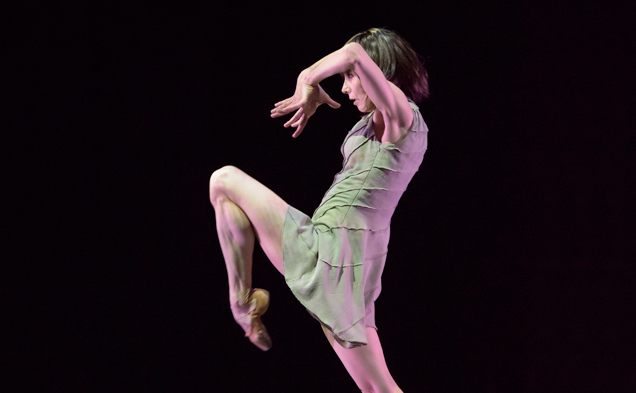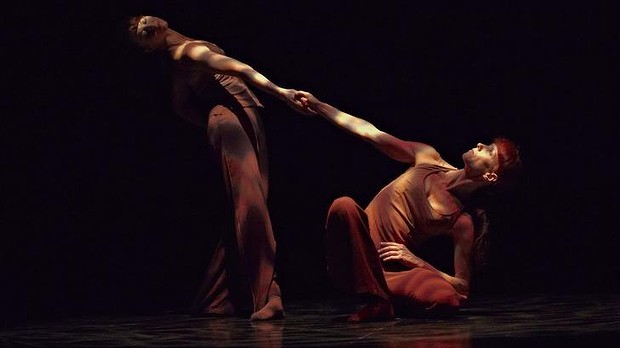★★★★☆ The ballet superstar’s farewell tour offers an understated exit from the stage.
Drama Theatre, Sydney Opera House
19 August, 2015
“If you love her, let her go,” so the saying goes, and now after 35 years in the spotlight, Sylvie Guillem, perhaps the most astoundingly talented dancer in living memory, revered and adored the world over, is taking her final bows. After a stellar career which has redefined the art-form one final globe-trotting tour marks her farewell, but rather than going out with a supernova, this star has created a show that is more about personal poignancy than physical pyrotechnics. Perhaps some may feel cheated by this understated exit, but what this show lacks in chutzpah its makes up for in sincerity. In typical fashion, Life in Progress isn’t about self-celebration or aggrandisement, nor is it about sappy sentimentality or nostalgia. In its own quietly beautiful, stubbornly uncompromising, surprisingly modest way it is the very essence of Guillem the person, as well as Guillem the dancer.
That’s not to say there isn’t much to marvel at though. She began her career as a dance prodigy, entering the Paris Ballet at 16 before being handpicked by the great Rudolf Nureyev to be elevated to the highest rank in the company – étoile – when she was just 19. Guillem’s poise, flexibility, strength and irresistible charisma combined to make what many believed to be the perfect balletic instrument. Now aged 50, her abilities remain just as potent, but the brutal struggle to rigorously maintain her extraordinary physical powers as she enters her sixth decade is a daily battle against the forces of nature. This final evening of dance, currently making its way around the world, would be an extraordinary feat for a dancer half her age, but Guillem still makes every step, leap and turn look effortless. Not for one second is there ever a hint that this blindingly bright light is fading.
 Akram Khan’s Technê (photo: Bill Cooper)
Akram Khan’s Technê (photo: Bill Cooper)
In addition to the physical challenges of performing this programme, Guillem’s selection for Life in Progress is also demanding on its audience, with a bold yet risky collection of four contemporary works. Two have been created specifically for this final tour, but while no doubt this afforded Guillem one last enriching opportunity to share the intimacy and joy of collaborating with dear friends in the studio, the results teeter perilously close to being generic.
Akram Khan’s Technê evokes a primitive rite as Guillem scuttles with squat, insectoid shuffles around a pool of moonlight. The spooling lines of Guillem’s impossibly long limbs are only occasionally allowed to burst free in sudden explosions of swirling gestures that then retreat into taut, insular quivers or supine sprawls. Khan toys with a thin veneer of conceptualism that hints at themes of nature versus urbanism, but with very little conspicuous dramatic momentum to explore this in any depth. Before it’s had a chance to make a point it’s over, leaving little of any substance to ponder on.
Russell Maliphant’s Here & After pairs Guillem with superb La Scala soloist Emanuela Montanari, who shares many of the same physical attributes. Maliphant’s theatrical intentions are far clearer than Khan’s; beginning as a mirror image of one another, the two shadowy figures move in slow, deliberate arcs that gradually accelerate and fracture. Becoming sparring partners locked in a charged duel, graceful fluidity is replaced with sharp, angular lines as the pair grapple and twist through a brisk interplay of form and movement. It’s a satisfying work in many ways, the choreography, lighting, and score are all pleasing and slick, but this piece rarely illuminates the full potential of Guillem’s abilities or taps into her vast capacity for storytelling.
 Russell Maliphant’s Here & After
Russell Maliphant’s Here & After
Another duet by one of Guillem’s most cherished creative partners, William Forsythe, is arguably the finest choreography on offer in this programme, although strictly speaking it’s included to allow Guillem some time to catch her breath. Duo2015, performed by Brigel Gjorka and Riley Watts, is both highly cerebral and impressively polished in its structure and intention. As the pair attempt to mimic each other’s small, self-conscious, tentative shrugs and loose, swinging limbs, the movement begins to bloom from these simple, unrefined gestures into graceful, balletic extensions of blurred, airy forms. Ratcheting up the tension even further, these two bodies become contorted knots of muscle, slapping the ground with flailing outstretched arms. Occasionally we’re offered a few photographic moments of formal steps, but only so these Classical echoes can then be warped through Forsythe’s singularly inventive and intellectual lens.
If the rest of the evening feels insufficiently profound given the magnitude of its purpose, the closing work, Bye by Mats Ek, finally delivers the emotional punch that seems fitting for Guillem’s farewell. A doorway gives us a glimpse of another world, one we cannot enter. Guillem steps through into our universe and for an all too brief while communicates a quirky but intimately elegiac story infused with a Chaplin-esque wit. She eventually returns to her world through the doorway, staring back at us as she is slowly lost in a crowd of friends and family. In the end it’s not the spectacular triumphs of her dance, but her eyes, pricked with both sadness and relief, which yield up the most touching moment of the night.
Sylvie Guillem: Life in Progress is at the Sydney Opera House Drama Theatre until August 25.













Comments
Log in to join the conversation.